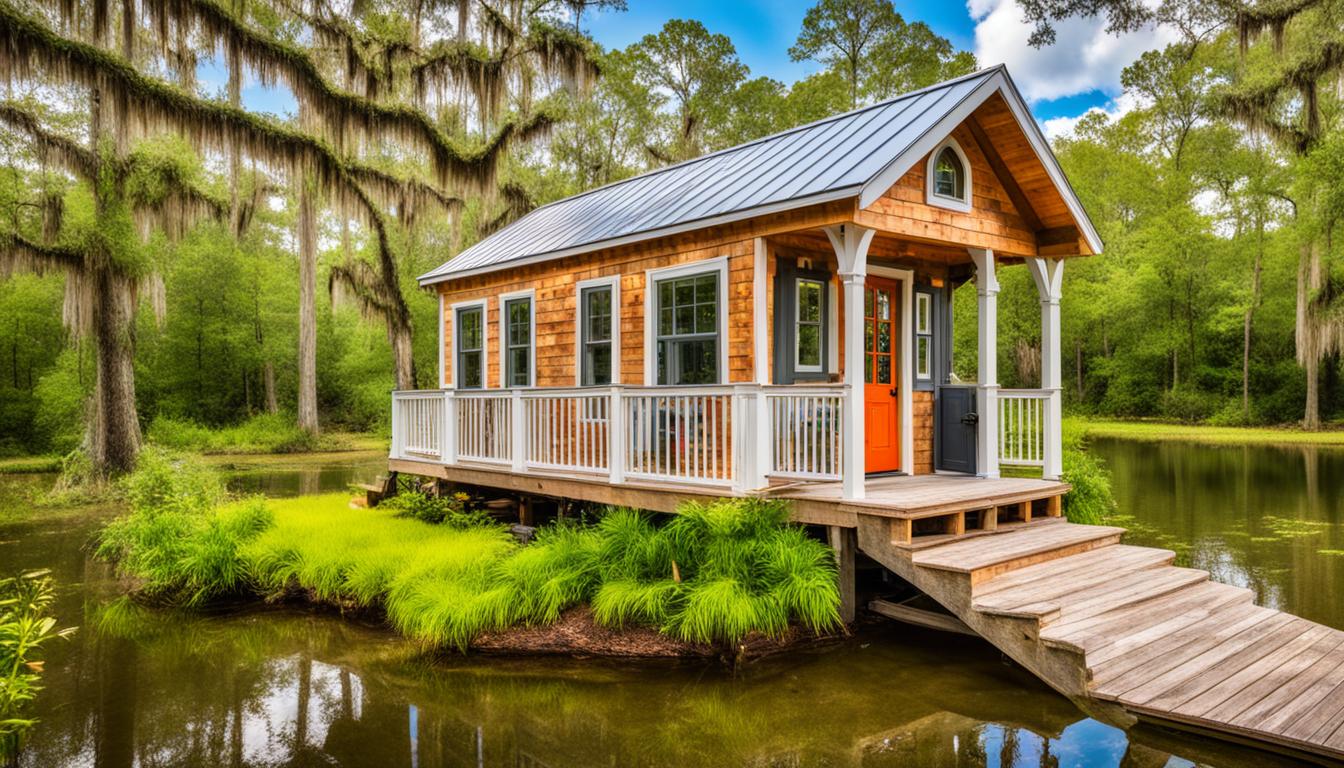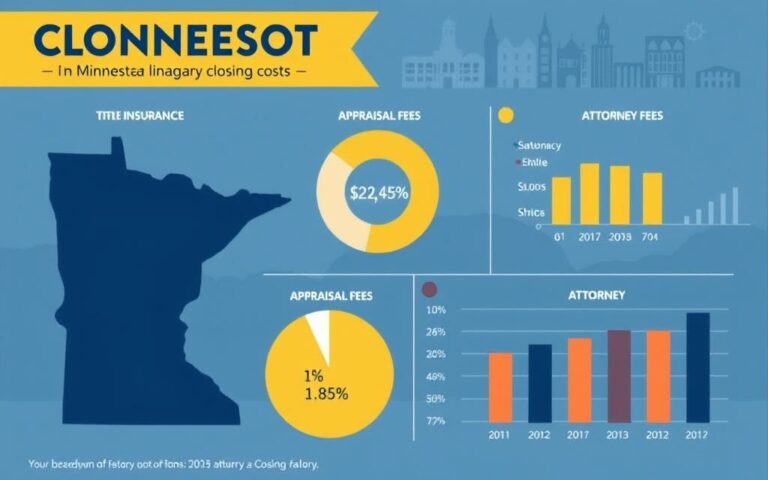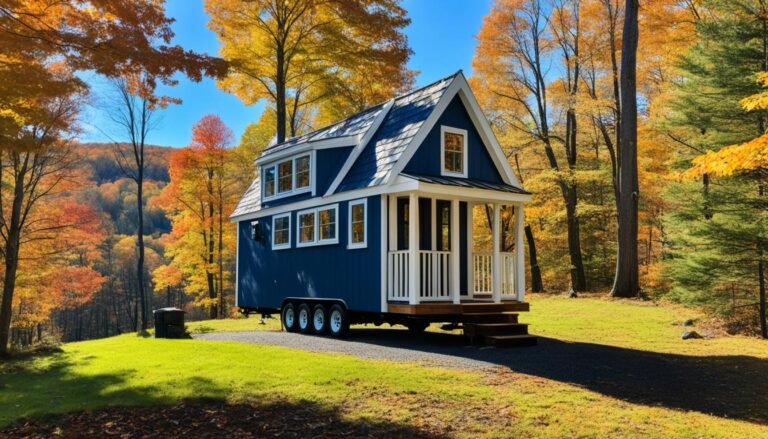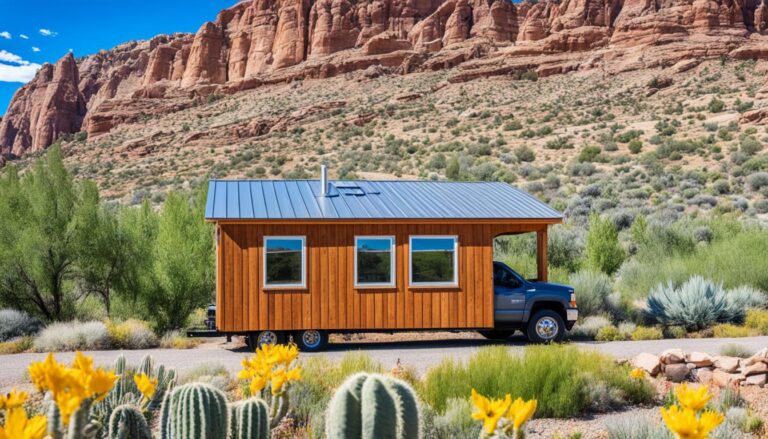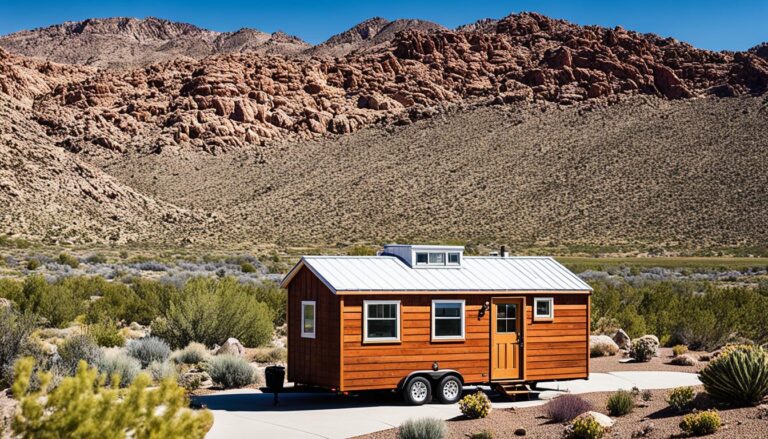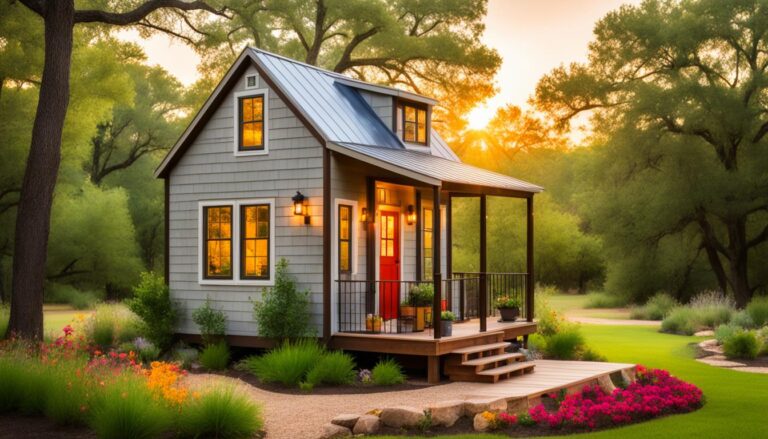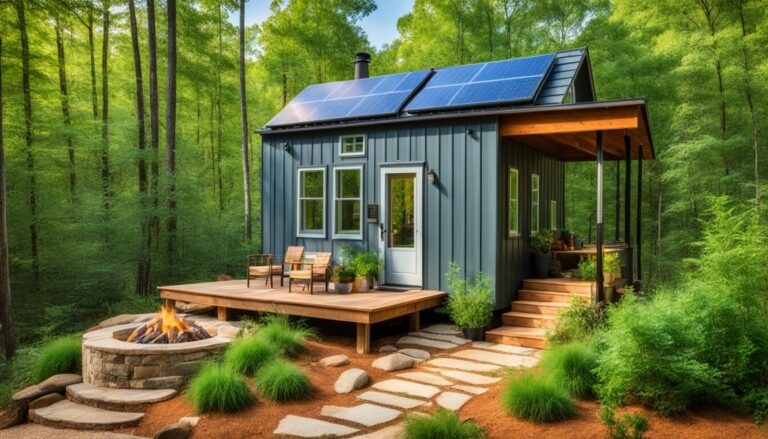Tiny House Placement in Louisiana: Learn How
Where can I put a tiny house in Louisiana? Are there specific zoning laws and regulations that govern tiny house living in the state? If you’re considering embracing the minimalist lifestyle in the vibrant setting of Louisiana, it’s important to understand the best locations for tiny houses, the legalities involved, and the unique opportunities available. Let’s dive into the world of tiny house placement in Louisiana and discover how you can make your dream of living small a reality.
Key Takeaways:
- Research specific town zoning ordinances and building codes to ensure compliance with regulations.
- Consider the pros and cons of tiny house living in Louisiana, including varying zoning regulations and limited space.
- Louisiana follows the International Residential Code (IRC) Appendix Q for tiny houses built on permanent foundations.
- Some of the best locations for tiny houses in Louisiana include New Orleans, Baton Rouge, Shreveport, Lafayette, Lake Charles, and Alexandria.
- When placing a tiny house in Louisiana, consider factors such as access, parking, orientation, and infrastructure needs.
Tiny House Living in Louisiana: Pros and Cons
Living in a tiny house in Louisiana comes with its own set of pros and cons. Let’s explore the benefits and challenges of this unique lifestyle.
Benefits of Living in a Tiny House in Louisiana
- Sustainability: Tiny house living aligns with the cultural shift towards sustainability. By adopting a smaller living space, you reduce your ecological footprint.
- Supportive Regulations: Louisiana has been embracing the tiny house movement, with some cities and parishes implementing regulations to support and accommodate tiny house living.
- Economic Affordability: One of the significant advantages of tiny house living is its economic affordability. Compared to traditional homes, tiny houses require less financial investment.
- Growing Community Presence: Louisiana has a growing community of tiny house enthusiasts. Joining this community provides opportunities for connections, shared resources, and a sense of belonging.
Living in a tiny house offers a unique blend of practicality, comfort, and beauty. It allows you to simplify your life, focus on what truly matters, and appreciate the little things.
Challenges of Tiny House Living in Louisiana
- Varying Zoning Regulations: While some areas have embraced tiny house living, others may have strict regulations or limitations on where you can place a tiny house. It’s crucial to research and understand the zoning regulations in your desired location.
- Limited Space: Living in a tiny house requires downsizing and adjusting to limited space. It’s essential to be mindful of your possessions and prioritize what’s truly necessary.
“Living in a tiny house allows you to simplify your life and focus on what truly matters.”
Despite the challenges, many people find that the benefits of tiny house living outweigh the drawbacks. It’s a lifestyle that encourages conscious consumption, minimalism, and a deeper connection with the environment.
To further explore whether tiny house living in Louisiana is right for you, let’s dive into the zoning laws and best locations for tiny houses in the next sections.
Zoning Laws in Louisiana for Tiny Houses
When it comes to tiny house placement in Louisiana, understanding the zoning laws is essential. Louisiana follows the International Residential Code (IRC) Appendix Q for tiny houses built on permanent foundations. This code sets out specific requirements to ensure the safety and livability of tiny houses.
Under these regulations, tiny houses must have a minimum room size of 120 square feet, providing adequate space for living, sleeping, and other activities. Lofts, a common feature in tiny houses, must have windows and stairs for safe access and egress. Additionally, the IRC requires a minimum ceiling height of 7 feet to allow for comfortable movement within the living area.
While these regulations provide guidance for permanent tiny houses, there is currently no clear legislation addressing transitional structures as a housing solution. Transitional structures are often used for temporary accommodations or as an intermediate step towards permanent housing. To ensure compliance with all guidelines and requirements, it is recommended to consult with local city or parish zoning offices.
By understanding and complying with the zoning laws in Louisiana, individuals can find legal places for their tiny houses and avoid potential legal complications. Zoning laws ensure the safety and compatibility of tiny houses with existing neighborhoods and help maintain a harmonious living environment for all residents.
“Knowing and complying with local zoning laws is crucial for tiny house placement in Louisiana. It’s important to be aware of the specific requirements for room size, lofts, and ceiling height. Consulting with local zoning offices can provide the necessary guidance to ensure compliance and create a safe and legal living space.” – [Real Name], Tiny House Advocate
Best Locations for Tiny Houses in Louisiana
When considering the placement of a tiny house in Louisiana, it’s important to explore the best locations that offer a welcoming environment and convenient amenities. Here are some top choices:
New Orleans
New Orleans is not only known for its vibrant culture and lively atmosphere but also for its acceptance of tiny house living. The city offers a variety of zoning options and parking spaces, making it an ideal location for tiny house enthusiasts.
Baton Rouge
Baton Rouge, the capital city of Louisiana, is another excellent choice for tiny house placement. With its diverse neighborhoods and supportive community, finding a spot for your tiny house in Baton Rouge is relatively easy.
Shreveport
Shreveport, located in northwest Louisiana, is a city that embraces the tiny house movement. It provides various parking options, including tiny house communities and dedicated spaces for tiny house owners.
Lafayette
Lafayette is a thriving city in southern Louisiana that offers both urban amenities and a close-knit community. With its progressive attitude towards alternative housing solutions, Lafayette provides numerous opportunities for placing your tiny house.
Lake Charles
Located near the Texas border, Lake Charles is a picturesque city that boasts beautiful scenery and a friendly atmosphere. Tiny house enthusiasts will find a warm welcome and a range of parking options in this thriving community.
Alexandria
Alexandria, situated in the heart of Louisiana, is another attractive location for tiny house living. This city offers a combination of affordability, convenience, and a supportive community, making it an excellent choice for tiny house placement.
“Louisiana offers a variety of thriving cities that provide the perfect backdrop for tiny house living.”
In addition to these popular cities, several tiny house communities have emerged in Louisiana, providing individuals with like-minded neighbors and a supportive environment. Some notable communities include Santosha Village and Burleigh Plantation, offering a sense of community and a range of parking options for tiny house owners.
Whether you prefer the excitement of city life or the tranquility of smaller towns, Louisiana has plenty to offer in terms of tiny house placement. With welcoming communities, various parking options, and a growing acceptance of the tiny house movement, the state provides ample opportunities to create the lifestyle you desire.
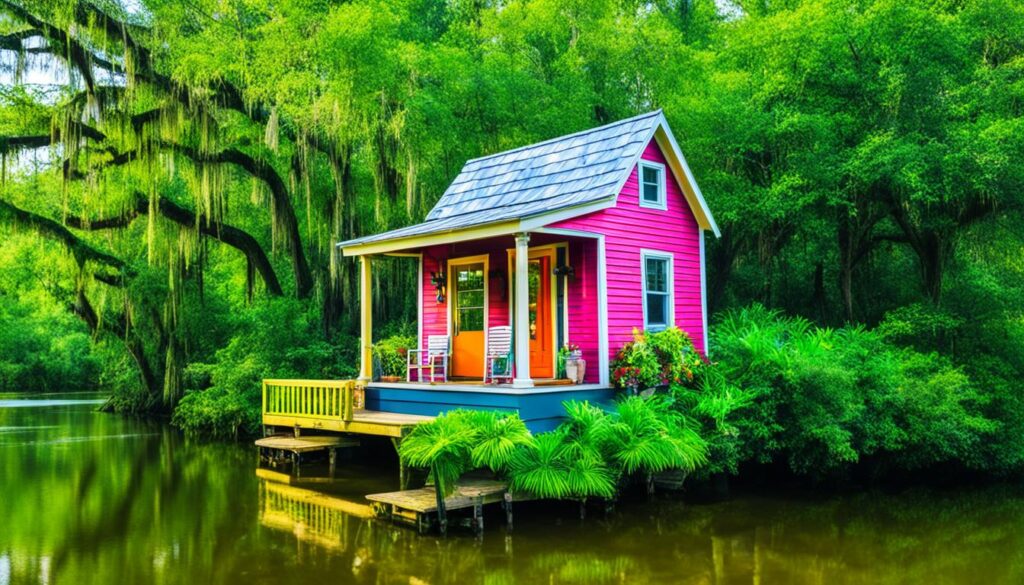
Building a Tiny House in Louisiana: DIY or Professional Help?
When it comes to building a tiny house in Louisiana, you have two main options: DIY construction or hiring a professional builder. Both approaches have their own advantages and considerations, so it’s important to weigh them carefully before making a decision.
If you’re confident in your construction skills and have the time and dedication to invest in the project, DIY construction can be a rewarding experience. It allows you to have full control over the design and customization of your tiny house. DIY construction also offers potential cost savings as you won’t have to pay for labor. However, it’s crucial to note that building a tiny house is a complex task that requires a strong foundation of knowledge in construction techniques, electrical systems, and plumbing. It’s essential to research and educate yourself about local building codes and regulations to ensure compliance.
On the other hand, hiring a professional builder can provide numerous benefits, especially for those who lack construction experience or prefer to leave the work to experts. Professional builders, such as Great Lakes Tiny Homes, have the necessary expertise and experience to construct a high-quality and code-compliant tiny house in Louisiana. By working with an RVIA-certified builder, you can have peace of mind knowing that your tiny house meets industry standards.
Additionally, professional builders often have established relationships with suppliers and subcontractors, which can streamline the construction process and result in a more efficient timeline. Furthermore, working with a professional builder may open up financing options and insurance coverage that might otherwise be difficult to obtain on your own.
Ultimately, the decision between DIY construction and hiring a professional builder comes down to your personal circumstances, skills, and preferences. If you have the necessary skills, time, and dedication, DIY construction can be a fulfilling and cost-effective choice. However, if you prefer the convenience, expertise, and assurance of working with professionals, hiring a builder is the way to go.
Whichever path you choose, it’s crucial to familiarize yourself with the local building codes and regulations specific to tiny houses in Louisiana. Following these codes and obtaining the necessary permits will help you avoid legal complications and ensure a smooth building process.
Key Considerations for Tiny House Placement in Louisiana
When it comes to placing a tiny house in Louisiana, there are several key considerations to keep in mind. These factors will help determine the ideal location and ensure a seamless transition to tiny house living. Here are a few key points to consider:
Access to the Property
It’s important to assess the accessibility of the property before placing a tiny house. Consider factors such as road conditions, proximity to main roads, and ease of entry for delivery trucks or construction vehicles.
Parking for Cars and Visitors
Ensure that there is sufficient parking space not only for your own vehicle but also for any visitors you may have. Check if there are any parking restrictions or guidelines in your chosen location and ensure compliance with local regulations.
Orientation and Sunlight
Take into account the orientation of the property in relation to the sun. A well-oriented tiny house can maximize natural light and energy efficiency. It’s worth considering the placement of windows, patios, and outdoor living spaces to take advantage of the sunlight.
Deciduous Trees for Temperature Regulation
Consider the presence of deciduous trees when selecting a location for your tiny house. These trees can provide natural shade during hot summers while allowing sunlight through during the colder months, assisting with temperature regulation and energy efficiency.
Infrastructure Needs
Ensure that the chosen location can meet the infrastructure needs of your tiny house. Check for the availability of essential services such as water, electricity, sewage, and internet connectivity. Additionally, consider the cost and feasibility of installing or connecting to these utilities.
Security Measures
Your safety and the security of your tiny house are paramount. Take into account the overall security of the location, and consider additional measures such as installing fences, security cameras, or motion sensor lights. These precautions will provide peace of mind and protect your investment.
By carefully considering these factors, you can select the optimal placement for your tiny house in Louisiana. It’s essential to strike a balance between your personal preferences, zoning regulations, and practicality to ensure a comfortable and enjoyable living environment.
Infrastructure for Tiny House Living in Louisiana
When it comes to tiny house living in Louisiana, infrastructure plays a crucial role in ensuring a comfortable and functional living space. To create a suitable environment for your tiny house, several key aspects need to be considered.
Access and Parking
One of the primary considerations for infrastructure is ensuring access to the property. This includes roads, driveways, turnarounds, and parking pads. A well-maintained gravel driveway is a popular and economical option for tiny house owners in Louisiana.
Utilities
Utilities are another essential aspect of tiny house infrastructure. For water supply, connections to city water or the installation of a well can ensure a reliable water source. When it comes to power, solar power systems are a sustainable and off-grid option for tiny houses in Louisiana. Additionally, propane can be used for appliances such as stoves and heaters.
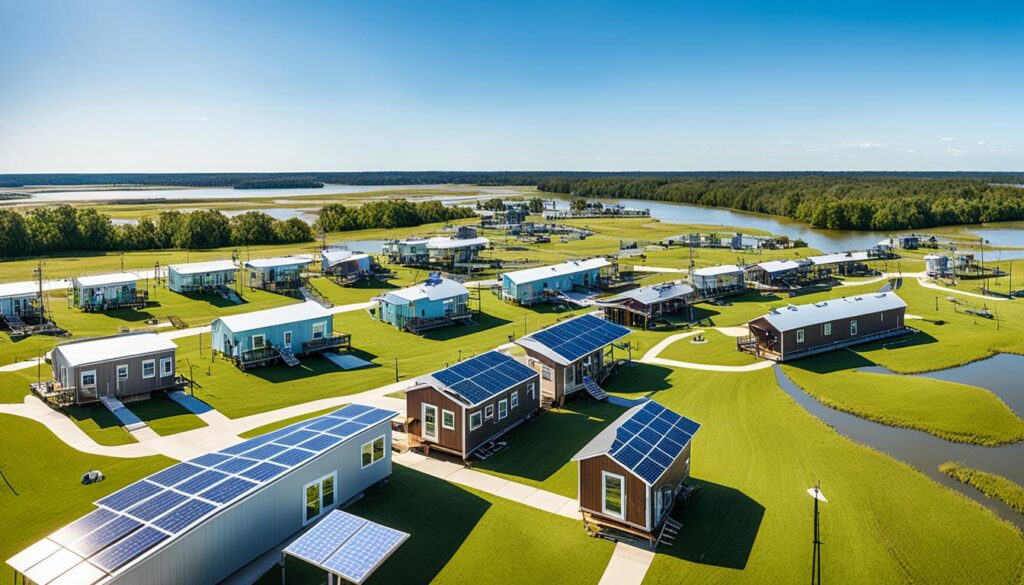
Waste Management
Managing waste is crucial for tiny house living. It’s essential to have systems in place for handling trash, recyclables, compostables, greywater, and composting toilet waste. These systems can include designated bins or containers and proper disposal methods to ensure a clean and environmentally conscious living environment.
By considering and addressing these infrastructure needs, you can create a comfortable and functional living space for your tiny house in Louisiana. From access and utilities to waste management, each aspect plays a crucial role in enhancing your overall tiny house living experience.
Security Measures for Tiny House Living in Louisiana
When it comes to tiny house living in Louisiana, ensuring the safety and security of your home is crucial. Here are some essential security measures to consider:
- Choose a secluded location: Look for a spot that offers privacy and seclusion, away from prying eyes and potential intruders.
- Secure the property: Install fences or gates around your tiny house to create a physical barrier against unauthorized access.
- Remove wheels from the trailer: By removing the wheels, you make it more difficult for someone to tow away your tiny house.
Implementing these security measures can provide peace of mind and help protect your investment. While it’s important to take precautions, it’s also essential to recognize that most criminals are deterred by the challenges and specific nature of stealing a tiny house.
For more comprehensive guidance on keeping your tiny home safe and secure, you can refer to this article by L. Pratt Homes.
Pros and Cons of Solar Power for Tiny Houses in Louisiana
Solar power is a popular choice for powering tiny houses in Louisiana, offering numerous benefits and advantages. One of the key benefits of solar power for tiny homes is the ability to harness renewable energy, reducing reliance on the grid and minimizing carbon footprint. By utilizing the abundant sunshine in Louisiana, tiny house owners can enjoy lower electricity bills and contribute to a more sustainable environment.
Another advantage of solar power is the potential for off-grid living. With a properly designed and installed solar system, tiny house owners can enjoy the freedom and independence of generating their own electricity. This is particularly beneficial for those seeking a self-sufficient lifestyle or living in remote areas without access to traditional power sources.
Furthermore, solar power offers long-term cost savings. While the upfront cost of solar panel installation may be a challenge for some, the investment can pay off over time. By generating free electricity from the sun’s energy, tiny house owners can significantly reduce or eliminate their monthly electricity bills, allowing for greater financial flexibility and stability.
“Solar power provides a sustainable and off-grid energy solution for tiny houses in Louisiana. It reduces reliance on the grid, lowers electricity bills, and contributes to environmental sustainability.”
However, there are also challenges to consider when it comes to using solar power for tiny houses in Louisiana. The upfront cost of purchasing and installing solar panels can be a barrier for some individuals. While there are incentives and tax credits available to help offset the initial expenses, it’s essential to carefully evaluate the financial implications and weigh them against the long-term benefits.
Another challenge is the variability of solar power generation. While Louisiana is known for its sunny weather, cloudy days can affect the efficiency and output of solar panels. This can result in limited power generation, requiring alternative sources of electricity during periods of low sunlight. It’s important to have contingency plans in place to ensure consistent power supply, such as using battery storage systems or having access to grid-connected electricity as a backup.
Lastly, proper maintenance and upkeep of the solar power system are essential to ensure optimal performance. This includes regular cleaning of the solar panels, monitoring the system’s efficiency, and addressing any potential issues or repairs. It’s recommended to work with professionals who specialize in solar power installations to ensure the system operates efficiently and effectively.
In conclusion, solar power offers numerous benefits for powering tiny houses in Louisiana, ranging from reduced reliance on the grid and lower electricity bills to environmental sustainability. However, it’s important to consider the upfront cost, limitations in power generation during cloudy days, and maintenance requirements. By carefully weighing the pros and cons, individuals can make informed decisions and enjoy the advantages of solar power in their tiny homes.
Conclusion
Louisiana offers a unique and attractive environment for tiny house living, making it an ideal choice for those seeking a minimalist lifestyle. The state’s rich culture, supportive regulations, and growing community presence contribute to the appeal of tiny house living in Louisiana.
Despite the challenges that may arise, such as navigating local zoning laws and regulations, the benefits of living in a tiny house in Louisiana are abundant. Firstly, affordability is a key advantage, as the cost of a tiny house in the state ranges from $40,000 to $120,000. This price range is significantly lower than traditional homes, allowing individuals to enjoy a more financially sustainable lifestyle.
Additionally, tiny house living in Louisiana promotes sustainability. By downsizing living spaces, residents consume fewer resources and reduce their ecological footprint. Embracing a minimalist lifestyle aligned with the local culture creates an opportunity for an eco-conscious way of living.
“Tiny house living in Louisiana is about more than just the practicality and affordability—it’s a unique way of life that embraces the state’s history and culture, offering an unparalleled experience for those who dare to be different.”
Moreover, the quality of life in a tiny house in Louisiana is exceptional. The close-knit tiny house community fosters a supportive network, enabling residents to share experiences, tips, and resources. Additionally, choosing a tiny house lifestyle often translates into a greater connection with nature and a focus on experiences rather than material possessions.
By understanding and complying with local zoning laws and regulations, individuals can find legal places to put their tiny houses in Louisiana. Whether it’s a spacious property in New Orleans, a cozy spot in Baton Rouge, or a scenic location in Lafayette, there are various options for tiny house placement in the state.
In conclusion, tiny house living in Louisiana offers a unique and rewarding experience. With its affordability, sustainability, and quality of life advantages, it remains an attractive option for those seeking a simpler and more intentional way of living. By understanding the local regulations and finding the right location, individuals can create their ideal living spaces and embark on an exciting journey in the heart of Louisiana.
Additional Information (Optional)
This section provides additional information and resources for those interested in tiny house placement in Louisiana. Whether you’re looking for further guidance, support, or inspiration, the following resources can help you navigate the process:
1. Tiny House Alliance USA: Visit their website for a comprehensive guide on tiny house placement in Louisiana, including state-specific zoning laws, regulations, and resources.
2. Books and Publications: Explore books like “Tiny House Living” by Ryan Mitchell and “Tiny House Decisions” by Ethan Waldman, which offer valuable insights and practical tips for building and living in a tiny house.
3. Local Organizations and Communities: Connect with local tiny house communities and organizations in Louisiana to learn from their experiences and gain support from like-minded individuals.
Remember, the key to successful tiny house living in Louisiana is thorough research, compliance with regulations, and finding a supportive network. With the right resources and information, you can embark on your tiny house journey with confidence.

